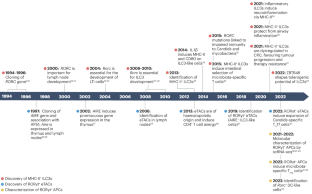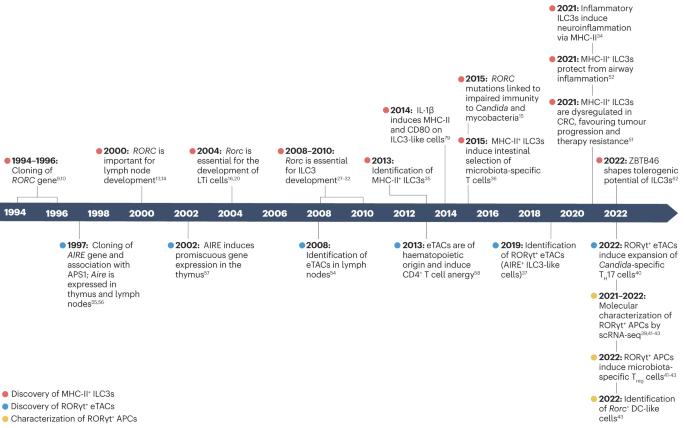新出现的 RORγt+ 抗原递呈细胞家族。
IF 67.7
1区 医学
Q1 IMMUNOLOGY
引用次数: 0
摘要
抗原递呈细胞(APC)是免疫反应的主调节器,它直接与 T 细胞相互作用,协调产生不同的功能结果。目前存在多种类型的专业抗原递呈细胞,包括传统的树突状细胞、B 细胞和巨噬细胞,还有许多其他类型的细胞在抗原递呈中扮演着非典型的角色,如胸腺上皮细胞、内皮细胞和粒细胞。越来越多的证据表明,存在着一个新的 APC 家族,其特征是系规范转录因子视黄酸受体相关孤儿受体-γt(RORγt),并证明这些 APC 在形成免疫、炎症和耐受性方面发挥着关键作用,特别是在宿主与微生物相互作用的情况下。这些 RORγt+ APCs 包括第 3 组先天性淋巴细胞亚群、胸膜外自身免疫调节剂表达细胞以及其他潜在的新兴群体。在此,我们总结了发现这些 RORγt+ APCs 及其相关功能的主要发现。我们讨论了近期报道中的不一致之处,并找出了我们在这一新兴领域的知识空白,该领域在促进我们对基本免疫概念的理解方面具有巨大潜力。本文章由计算机程序翻译,如有差异,请以英文原文为准。


The emerging family of RORγt+ antigen-presenting cells
Antigen-presenting cells (APCs) are master regulators of the immune response by directly interacting with T cells to orchestrate distinct functional outcomes. Several types of professional APC exist, including conventional dendritic cells, B cells and macrophages, and numerous other cell types have non-classical roles in antigen presentation, such as thymic epithelial cells, endothelial cells and granulocytes. Accumulating evidence indicates the presence of a new family of APCs marked by the lineage-specifying transcription factor retinoic acid receptor-related orphan receptor-γt (RORγt) and demonstrates that these APCs have key roles in shaping immunity, inflammation and tolerance, particularly in the context of host–microorganism interactions. These RORγt+ APCs include subsets of group 3 innate lymphoid cells, extrathymic autoimmune regulator-expressing cells and, potentially, other emerging populations. Here, we summarize the major findings that led to the discovery of these RORγt+ APCs and their associated functions. We discuss discordance in recent reports and identify gaps in our knowledge in this burgeoning field, which has tremendous potential to advance our understanding of fundamental immune concepts. Recent studies have revealed a family of antigen-presenting cells (APCs) marked by the transcription factor RORγt that fundamentally shape immunity, inflammation and tolerance. This article reviews heterogeneity among RORγt+ APCs, their associated functions and the future promise of this new field.
求助全文
通过发布文献求助,成功后即可免费获取论文全文。
去求助
来源期刊

Nature Reviews Immunology
医学-免疫学
CiteScore
93.40
自引率
0.40%
发文量
131
审稿时长
6-12 weeks
期刊介绍:
Nature Reviews Immunology is a journal that provides comprehensive coverage of all areas of immunology, including fundamental mechanisms and applied aspects. It has two international standard serial numbers (ISSN): 1474-1733 for print and 1474-1741 for online. In addition to review articles, the journal also features recent developments and new primary papers in the field, as well as reflections on influential people, papers, and events in the development of immunology. The subjects covered by Nature Reviews Immunology include allergy and asthma, autoimmunity, antigen processing and presentation, apoptosis and cell death, chemokines and chemokine receptors, cytokines and cytokine receptors, development and function of cells of the immune system, haematopoiesis, infection and immunity, immunotherapy, innate immunity, mucosal immunology and the microbiota, regulation of the immune response, signalling in the immune system, transplantation, tumour immunology and immunotherapy, and vaccine development.
 求助内容:
求助内容: 应助结果提醒方式:
应助结果提醒方式:


